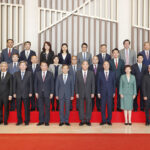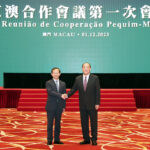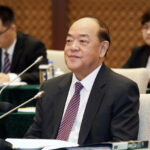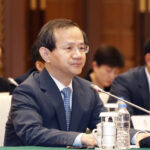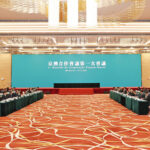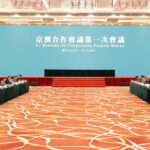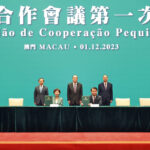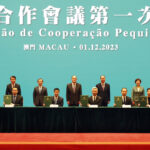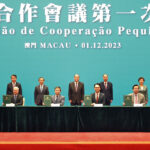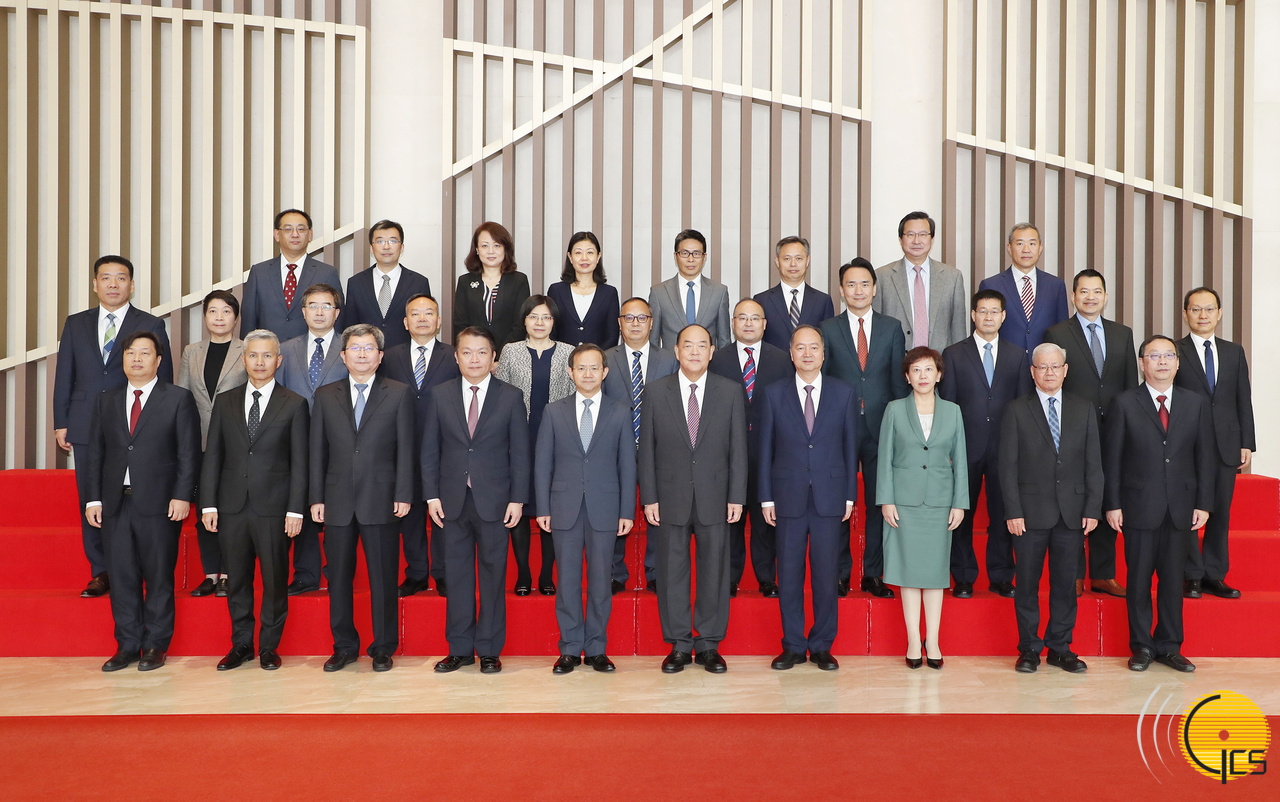 The Chief Executive, Mr Ho Iat Seng; the Mayor of Beijing, Mr Yin Yong; the Deputy Director of the State Council's Hong Kong and Macao Affairs Office and Director of the Liaison Office of the Central People's Government in the Macao Special Administrative Region, Mr Zheng Xincong, pose for a group photograph with respective government delegations.
The Chief Executive, Mr Ho Iat Seng; the Mayor of Beijing, Mr Yin Yong; the Deputy Director of the State Council's Hong Kong and Macao Affairs Office and Director of the Liaison Office of the Central People's Government in the Macao Special Administrative Region, Mr Zheng Xincong, pose for a group photograph with respective government delegations.
The first Beijing-Macao Cooperation Conference was held on 1 December at the China-Portuguese-speaking Countries Commercial and Trade Service Platform Complex. The Chief Executive, Mr Ho Iat Seng, and Deputy Secretary of the Beijing Municipal Committee of the Communist Party of China (CPC) and Mayor of Beijing, Mr Yin Yong, led their respective governmental delegations at the conference.
Both sides believe that Beijing-Macao cooperation in many fields has already been fruitful over the years. The formal establishment of the Beijing-Macao Cooperation Conference mechanism has produced a comprehensive and pragmatic exchange and cooperation platform between the two places. It has created a new setting for such cooperation; enabled joint promotion of economic and social prosperity and development in the two places; helped to improve continuously the well-being of the people in the two places; and made positive contributions to promoting the great rejuvenation of the Chinese nation through Chinese-style modernisation.
The conference was co-chaired by Mr Ho and Mayor Yin, who each delivered opening and concluding speeches. Deputy Director of the State Council Hong Kong and Macao Affairs Office and Director of the Liaison Office of the Central People's Government in the Macao Special Administrative Region (MSAR), Mr Zheng Xincong, also attended the conference.
Mr Ho noted cooperation between Beijing and Macao had been fruitful over the years. In recent years, the two places have focused on expanding and deepening cooperation regarding conventions and exhibitions, the economy and trade, tourism, culture, education, youth exchanges, and sports. Through the Beijing-Macao Cooperation Conference mechanism, respective government departments of the two places will strengthen exchanges, refine cooperation implementation plans, and increase collaboration in various fields. Mr Ho pointed out that strengthening cooperation between Beijing and Macao would help the appropriate diversification of Macao’s economy.
In terms of scientific and technological innovation and development, Beijing’s scientific-research strength and resources regarding innovation-related matters, would in combination strengthen key areas of cooperation between Beijing and Macao. This would help the two places in: the building of smart cities; the pursuit of shared, key technological breakthroughs; product innovation research and development; and the general implementation of innovation to create transformative achievements. All this would promote scientific and technological cooperation and development between the two places.
In terms of promoting the development of the ‘Big Health’ industry, the two places would jointly take advantage of the resources from Beijing’s traditional Chinese medicine industry. This would enable the two places to cooperate to promote overseas registration of products by traditional Chinese medicine companies, and further promote the international development of traditional Chinese medicine.
In terms of economic and trade convention and exhibition cooperation, ties between Beijing and Macao would continue to deepen in the field of conventions, exhibitions and trade events; based on Beijing’s role as an information hub and talent advantages. Macao welcomed Beijing institutions and enterprises to continue to participate in exhibitions and conferences, and utilise Macao’s role as a platform to expand the cooperation between China and Portuguese-speaking countries. The construction of the Guangdong-Macao Intensive Cooperation Zone in Hengqin was accelerating, and various sectors in Beijing were welcome to participate in the investment and development of the Cooperation Zone.
During the conference, Mayor Yin said that the State Council had approved the establishment by the Beijing Government and the MSAR Government, of a Beijing-Macao Cooperation Conference mechanism as a new stage of cooperation between the places. Deepening their exchanges and cooperation through such a mechanism was an important step in supporting the general direction of the Central Government's work regarding Hong Kong and Macao, and also reflected the consensus and the expectation that existed in the two places.
The city of Beijing and Macao have their own characteristics in terms of developmental positioning and endowment of resources. Their cooperative development had a solid foundation, had already achieved remarkable results, and still had huge and significant potential. The Beijing Government would work with the MSAR Government to consolidate and expand the important results of the cooperation conference, study and promote major cooperation projects, strengthen communications between departments, promote the transformation and implementation of conference results, promote all-round pragmatic cooperation, and create a new opportunities for the cooperation and development of the two places, from a new starting point.
The two places would together serve major national strategies and promote strategic interconnection between the Beijing-Tianjin-Hebei region’s coordinated development, and the Cooperation Zone in Hengqin. This would involve deepening cooperation in key areas, joining hands to carry out institutional opening-up and pilot projects, and improving cooperation mechanisms for the development of key industries such as technology and finance. There would also be promotion of people-to-people exchanges and strengthening of exchanges and cooperation in cultural tourism, exhibitions, and other fields.
Beijing would make use of available national policies to facilitate the presence of Hong Kong and Macao residents on the mainland, and provide more convenience for Macao compatriots to start businesses, find jobs, study and live in the city of Beijing. The Beijing Government firmly believes that with the joint efforts of both places, cooperation between Beijing and Macao will generate further success.
At the conference, the Secretary for Economy and Finance, Mr Lei Wai Nong, gave a briefing on the results of cooperation between Beijing and Macao in recent years. The Vice Mayor of Beijing, Ms Sima Hong, had at the outset, announced the areas of cooperation to be focused on at the first meeting of the Beijing-Macao Cooperation Conference. Both sides reviewed and approved the "Memorandum of the First Meeting of the Beijing-Macao Cooperation Conference".
At the conclusion of the conference, Mr Ho, Mayor Yin, and others present jointly witnessed the signing of, respectively: the "Memorandum of the First Meeting of the Beijing-Macao Cooperation Conference"; "Memorandum of Deepening Cooperation in Science and Technology Innovation between Beijing and Macao"; and " Strategic Cooperation Framework Agreement between the China Council for the Promotion of International Trade Beijing Branch and the Macao Trade and Investment Promotion Institute". Other documents signed were: "Memorandum of Understanding on Cultural and Tourism Exchanges and Cooperation between the Beijing Municipal Bureau of Culture and Tourism, the Cultural Affairs Bureau of the MSAR Government and the Macao Government Tourism Office"; "Cooperation Agreement between the Beijing Municipal Education Commission and the Education and Youth Development Bureau of the MSAR Government"; "Beijing-Macao Vocational Training Exchange and Cooperation Agreement"; and the "Educational and Scientific Cooperation Memorandum".


